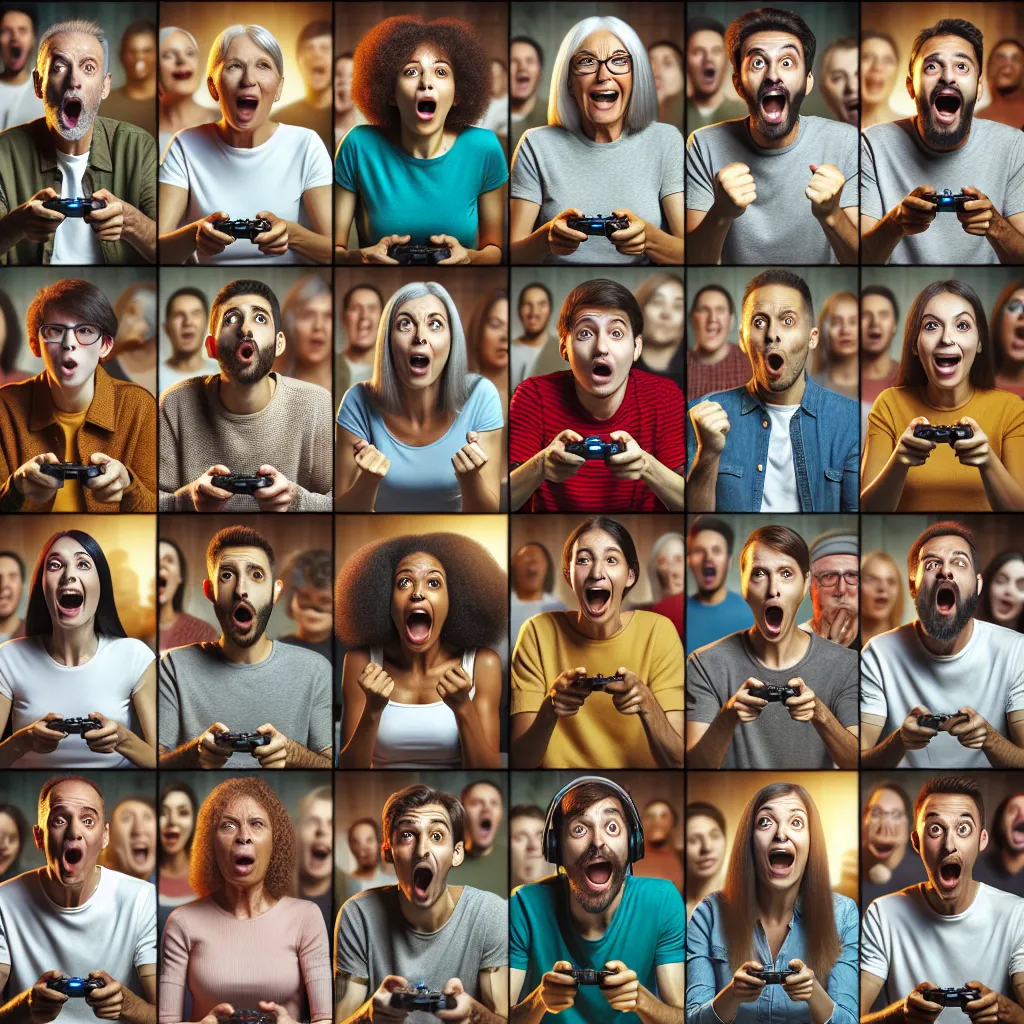The Relationship Between Gaming and Anxiety Disorders
Gaming has become an increasingly popular form of entertainment, with millions of people around the world immersing themselves in virtual worlds on a daily basis. While gaming can be a source of enjoyment and relaxation for many, it’s important to consider its potential impact on mental health, particularly its relationship with anxiety disorders.
Research has shown that excessive gaming can contribute to the development or exacerbation of anxiety disorders. The immersive nature of gaming can lead to heightened levels of stress and anxiety in some individuals. This is especially true in competitive gaming scenarios, where the pressure to perform can be intense.
Furthermore, the sedentary nature of prolonged gaming sessions can lead to a lack of physical activity, which is closely linked to increased anxiety levels. Moreover, the blue light emitted by screens can disrupt sleep patterns, potentially worsening anxiety symptoms.
However, it’s important to note that not all individuals who engage in gaming will experience negative effects on their mental health. Moderation and balance are key factors in mitigating the potential impact of gaming on anxiety disorders. Additionally, utilizing gaming as a social activity or incorporating physical movement through motion-controlled games can help alleviate some of the negative effects on mental health.
Ultimately, while gaming can be an enjoyable pastime, it’s essential to be mindful of its potential effects on mental well-being, particularly in relation to anxiety disorders. By promoting a balanced approach to gaming and being aware of the warning signs of excessive gaming, individuals can work towards maintaining a healthy relationship with this form of entertainment.
Exploring the Influence of Video Games on Depression
Exploring the influence of video games on depression is a significant aspect of understanding the impact of gaming on mental health. Research has shown that gaming can have both positive and negative effects on one’s mental well-being, and it is essential to delve into the specific relationship between video games and depression. While some studies suggest that excessive gaming can be linked to increased symptoms of depression, it is crucial to consider various factors such as the type of games played, the individual’s predisposition to depression, and the overall gaming habits.
Several studies have indicated that immersive and solitary gaming experiences, especially those involving intense competition or violence, may contribute to feelings of social isolation and emotional dysregulation, which are common symptoms associated with depression. However, it’s important to note that not all gaming experiences have negative consequences. For some individuals, video games can serve as a form of relaxation, stress relief, and even social connection, thereby potentially alleviating symptoms of depression.
Understanding the nuanced relationship between gaming and depression requires a comprehensive analysis of the individual’s gaming patterns, the content of the games, and their overall mental health status. By exploring these factors, researchers can gain insights into how video games may influence depression and develop strategies to promote healthier gaming habits that support positive mental well-being.
Gaming Addiction: Understanding the Psychological Impact
Gaming addiction, also known as “internet gaming disorder,” is a growing concern in the field of mental health. It is characterized by the inability to control one’s gaming habits, leading to significant impairment in daily life. Individuals suffering from gaming addiction often experience withdrawal symptoms when not gaming, and may neglect other important activities to continue gaming. This can have a detrimental impact on their psychological well-being.
Research has shown that excessive gaming can lead to increased levels of anxiety, depression, and social isolation. The immersive nature of video games, especially those with multiplayer capabilities, can create a sense of escape from real-life challenges, but can also contribute to feelings of loneliness and disconnection from reality. This can exacerbate existing mental health issues or serve as a catalyst for the development of new ones.
Furthermore, gaming addiction can disrupt sleep patterns, leading to fatigue and irritability. The constant stimulation and engagement inherent in gaming can make it difficult for individuals to relax and unwind, impacting their overall mental health. Additionally, the dopamine rush experienced during gaming can create a cycle of dependence, where individuals seek out gaming as a way to cope with negative emotions or stress, further perpetuating the addiction.
It is crucial for mental health professionals to recognize the signs of gaming addiction and provide appropriate support and intervention. By understanding the psychological impact of gaming addiction, it is possible to develop targeted treatment strategies to help individuals regain control over their gaming habits and improve their overall mental well-being.
The Role of Virtual Reality Gaming in Treating PTSD
Virtual reality gaming has emerged as a promising tool in the treatment of post-traumatic stress disorder (PTSD), offering a unique and immersive therapeutic experience for individuals struggling with this condition. PTSD is a mental health disorder that can develop after a person experiences a traumatic event, such as combat, natural disasters, or assault, and it can result in symptoms such as flashbacks, severe anxiety, and emotional numbness.
One of the key benefits of virtual reality gaming in treating PTSD is its ability to provide a controlled and safe environment for patients to confront and process their traumatic memories. By immersing individuals in realistic simulations of the triggering events, virtual reality exposure therapy enables them to gradually and safely engage with their traumatic experiences, helping to desensitize the emotional and physiological responses associated with their PTSD symptoms.
Moreover, virtual reality gaming has the potential to enhance traditional therapeutic approaches by offering a more engaging and interactive platform for individuals to address their PTSD symptoms. The immersive nature of virtual reality environments can help individuals feel more connected to the therapeutic process, leading to increased engagement and motivation to participate in treatment.
Furthermore, virtual reality gaming can provide a sense of empowerment and control for individuals with PTSD, allowing them to navigate and interact with virtual scenarios in a way that is not possible in conventional therapy settings. This can help individuals regain a sense of agency and mastery over their traumatic experiences, ultimately contributing to their overall psychological well-being.
Incorporating virtual reality gaming into PTSD treatment approaches represents a promising avenue for improving the mental health outcomes of individuals affected by this debilitating condition. Through its ability to provide a safe, engaging, and empowering therapeutic experience, virtual reality gaming has the potential to significantly impact the landscape of PTSD treatment, offering new hope for those seeking relief from their symptoms.
By integrating virtual reality gaming into clinical practice, mental health professionals can harness the innovative potential of this technology to better support individuals in their journey towards recovery from PTSD. As research in this area continues to advance, virtual reality gaming stands poised to play an increasingly vital role in the comprehensive treatment of PTSD, paving the way for more effective and personalized interventions that prioritize the mental well-being of those affected by this condition.
Can Gaming Help Improve Mental Well-being?
Gaming has long been a subject of debate when it comes to its impact on mental health. While excessive gaming has been linked to negative effects such as addiction and social isolation, there is growing evidence to suggest that gaming can actually have a positive impact on mental well-being. In recent years, researchers have been exploring the potential benefits of gaming in improving mental health, and the results are intriguing.
One of the ways in which gaming can help improve mental well-being is through its ability to provide a sense of accomplishment and mastery. Many games involve overcoming challenges and achieving goals, which can boost self-esteem and confidence. Additionally, gaming can act as a form of escapism, allowing individuals to take a break from the stressors of everyday life and immerse themselves in a different world. This can have a therapeutic effect, providing a much-needed mental break and relaxation.
Furthermore, gaming has been found to have a social aspect that can contribute to improved mental well-being. Online gaming communities and multiplayer games provide opportunities for social interaction and connection with others, which is important for combatting feelings of loneliness and building a support network. For individuals struggling with mental health issues, gaming can serve as a means of connecting with like-minded individuals who share similar interests.
It’s important to note that the benefits of gaming on mental health are not universal and should be approached with moderation. Excessive gaming can still have detrimental effects on mental well-being. However, when approached mindfully, gaming has the potential to improve mental health by providing a sense of achievement, offering a form of escape, and facilitating social connections.



